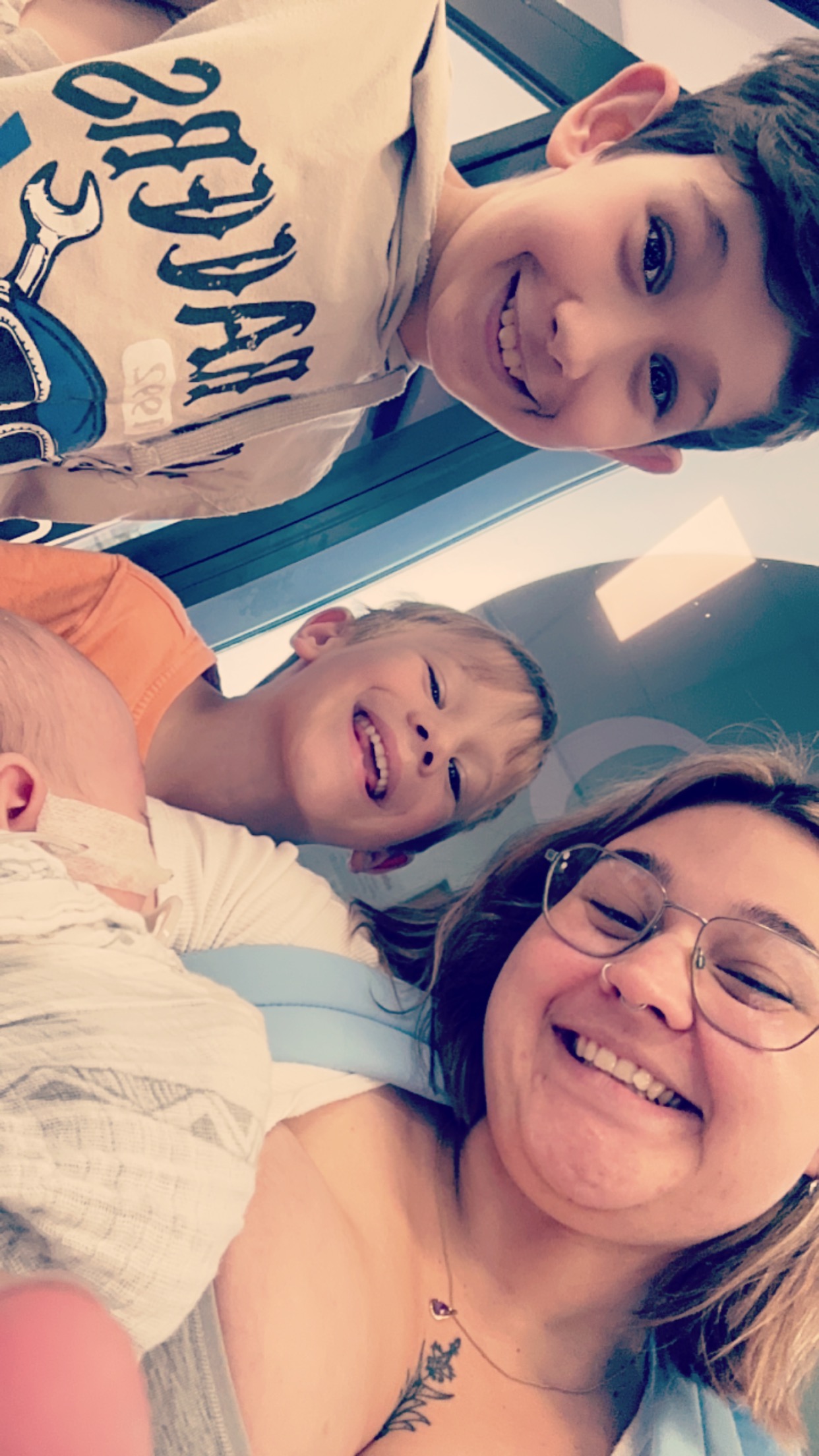My welcome to motherhood was a giant potty and pig trotters
Sashimi, soft cheese, and a glass of vino are the three naughty things many mothers dream of stuffing their faces immediately after giving birth. For some, it looks pretty different — it’s one whole month of eating pig trotters and ginger soup. It doesn’t sound very appetising. Pass me the paper bag, please.
This practice is called the ‘confinement period’, standard in many Asian, Indian, European, and Middle Eastern cultures. It’s a tradition where mother and baby are homebound for 30-40 days post-birth to rest, recover and bond. Sounds pretty blissful right? Just hold that thought for now. For me at the time, it’s like a hotel quarantine for 30-days.
As an Australian-born to Vietnamese parents, I had a choice to honour this tradition or forge my own parenting style. As an independent, fierce and very stubborn woman, I wanted to lead things my way. I was adamant that it had to be my way. Little did I realise it was the chronic perfectionist and control freak alter-ego that was talking. She was stealing every ounce of joy.
Of course, at the time, I didn’t realise this or could rationalise at the time how I was feeling. My perinatal depression and anxiety was an unwanted guest. Tapping its spiny fingers onto my brain and I was deeper and deeper into a hole I unknowingly dug for myself.
My unexpected confinement
My son, Hendrick (named after the famous Scottish gin), was delivered on 23 April 2016 after twelve hours of labour over an oversized purple potty. I was eager to go home from the depressing hospital and the midwives who asked too many questions like why I had such a big gap between my breasts. I think they just wanted to fill the void with awkward conversations, but I was too tired to entertain at the time. Bless them.
“I don’t know? One wanted to go East and the other, West, and they couldn’t agree?”
Once home, I was out the door on the second day, wearing adult diapers and drinking Sydney city’s finest cup of joe. To my family, that was frowned upon. I should have been homebound in their eyes.
The idea of confining myself indoors for 30-40 days was not an option. Family members told me that I was “stupid and ungrateful for not staying at my in-laws”. For context, it is common for mothers to stay or live with their in-laws following birth.
My mother-in-law came over every day for a month and brought with her the confinement experience. She cooked chicken soup and nutrient-dense meals. It sounds like an absolute delight, right? Wrong. I was desperate to be alone. Yet her persistence was killing me. This is textbook perfectionism.
My husband, without consulting me, gave his parents the spare keys to our place. I would have this anxiety about her coming over and checking how much milk I had pumped — and I felt tremendous shame if I didn’t. It would be rehearsed over and over in my head at night until it did actually happen.
I had mixed feelings of gratitude and stress to have my mother-in-law around. I was grateful that she was caring, loving and super excited about her first grandson. At the same time, I felt so unworthy and depleted. I was pushed into giving my son formula milk because she didn’t believe I was producing enough breast milk.
Because my MIL came over every day, I felt I didn’t have any personal space in my own home or the opportunity to enjoy being a new mum. I felt anxious all the time, even asking permission to hold my baby, leave the house or shower. I kept telling myself to “get over it and stop being selfish and that she was here because she wanted to help”.
You may be thinking, well, why didn’t you say anything? An authoritative parenting style is typical in Asian cultures and comes with very high expectations of their children. This was in my DNA for thirty years, so it is hard to shake off. In many Asian cultures, it is expected that you don’t question things because it means you don’t trust or respect your parents.
I was in my own world where I felt so alone, conflicted by my cultural heritage, and trying to figure out my new identity. I didn’t know what to do.
What other mums say about the confinement period
In Western Countries, confinement isn’t something that’s talked about. I know I haven’t painted the most incredible picture. The ideals of confinement are not to oppress, but instead, it’s all about the wellbeing of mother and baby. I agree that this is important.
A year later, I decided to ask some Aussie mums from various cultural backgrounds what they thought of the practice. For some, the first reaction is that it’s restrictive and ludicrous, but for most, they were avid fans.
One mother, who is South-East Asian, highly recommends it, but said some practices are questionable, “I would recommend it to other parents to some degree. There are a few questionable ones, for example sitting above a bed of hot charcoal speed up the recovery down there”.
It took some convincing from a mother with Greek heritage to be confined, “I did it with both my girls after some convincing by my mum, and I’m happy I did. It gives you a chance to heal from your c-section!”
Another mother was confined with her second baby after experiencing enormous stress and pressure with her firstborn, “This time I was so relaxed. It gave both me and the baby time to rebuild immunity. We restricted visitors”.
A Lebanese mother said she would do it again and was happy she did it, “I didn’t have a great birth although I had a vaginal delivery. I struggled to walk or sit properly for three weeks, so being out in public was the last thing on my mind!”
Outsourcing the confinement period
Not all parents have the luxury of having family in Australia to help them with their newborn. But for some that do, some parents are disinterested in looking after their grandkids. Bec is a friend of mine in my mother’s group who has parents overseas, and sadly, her in-laws are so disinterested in taking care of her baby, “They only live 10 minutes away, but don’t care! It’s madness”.
One of the mothers I spoke to doesn’t have family here, so she sponsored a nanny who came highly regarded from Singapore to look after herself, her baby and run the household, “It’s just cheaper to sponsor someone overseas to come here and take care of everything. These women cook, clean and take care of bub for you. You don’t get close to that level of service here”. Sponsoring someone from overseas is a little contentious. A few mums respond with outrage, commenting on the lack of support for local employment. Some have suggested the possibility of extramarital affairs between nanny and partner/husband.
Today, especially in the sharing economy, the concept of confinement is not only reserved for specific cultural backgrounds. Many mothers seek hired help, such as postnatal doulas, nannies — and as simple as having food delivered.
Overall, nothing prepared me for the culture clash
I felt prepared for childbirth and the possibility of perinatal depression; however, nothing prepared me for the cultural expectations with hormones on overdrive. I think the practice of confinement emphasises too much on physical wellbeing at the expense of emotional wellbeing.
I do see a lot of merit in practice, but it simply wasn’t for me. It would have been a different scenario had I been brought up overseas, in a country where it’s widely practised and talked about.
It’s worth noting that I had existing mental health issues. The pressures of being a new parent, coming to terms with my identity and understanding the nuances of culturally diverse families made it so much more challenging.
Fast forward to now, I still only have one child, but if I do decide to have another one, I’ll be better equipped to set boundaries. It just comes with being a lot more confident with myself and believing that yes, I got this! Asking for help is never a weakness but a strength in admitting that it’s impossible to do it all alone.
Cathy's Story
Please submit your details below and we will be in touch soon.
Related Fact Sheets

a new mum's story
this Christmas


%201.webp)




.webp)







%202.jpg)





.png)


.png)

